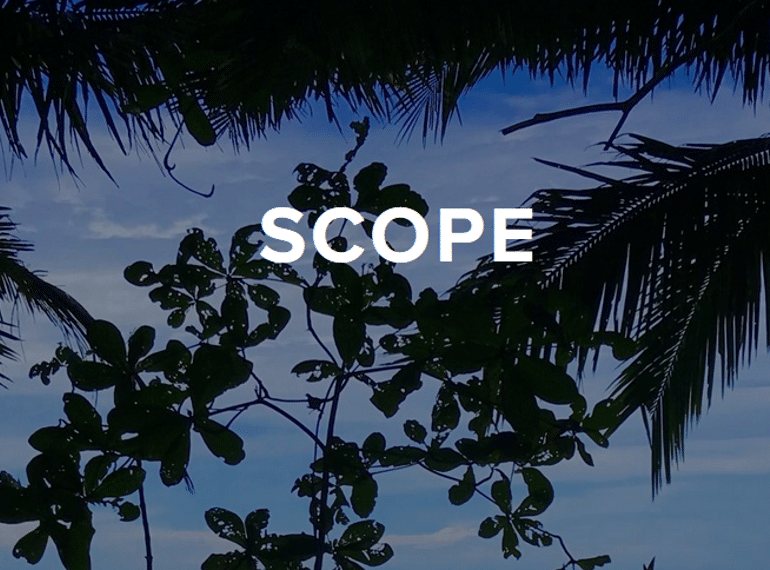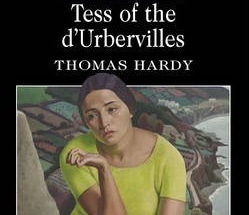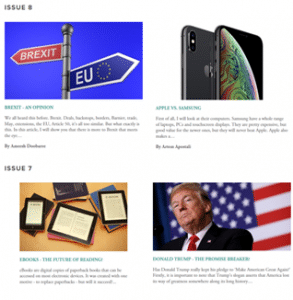
Two-and-a-half years after he founded it, sixth-former Ryan Ratnam’s website and online journal has stood the test of time as a platform for young people to write about what really interests them.
 Many QE boys and pupils from other leading schools have taken the opportunity to express themselves through the Scope Project. And, with no word limits imposed and considerable editorial freedom allowed, the range of topics explored is eclectic indeed, from Venezuelan hyperinflation to Was Thomas Hardy really a feminist, from Are we living in reality? to Facebook’s currency, Libra.
Many QE boys and pupils from other leading schools have taken the opportunity to express themselves through the Scope Project. And, with no word limits imposed and considerable editorial freedom allowed, the range of topics explored is eclectic indeed, from Venezuelan hyperinflation to Was Thomas Hardy really a feminist, from Are we living in reality? to Facebook’s currency, Libra.
Ryan was inspired to start Scope when he was part of a joint academic symposium with North London Collegiate School (NLCS) in Year 10, where he and his friends relished the experience of sharing ideas. He wanted to create a channel through which young people could share their interests and make topics digestible to others: “news for young people, by young people”, as he says.
The scope of Scope has now broadened, as Ryan also runs an affiliated society – Microscope – for QE boys in Years 7 & 8. The society allows them to investigate the topics that interest them, to share their perspectives on news and issues and to gain writing experience. Ryan meets with them fortnightly, when they discuss the news (in different sectors) and work on writing techniques. The boys then produce pieces each half-term for a dedicated section of the website.
Headmaster Neil Enright said: “My congratulations go to Ryan for his leadership in creating the Scope Project and for the persistence and hard work he and his team have shown to ensure its success over time.
“What he has done coheres very well with our aim as a School of nurturing free-thinking scholarship among the boys, encouraging them to go beyond the confines of their classroom syllabus, pursuing their own genuine academic interests.”
Ryan, who is Chief Editor, received some help early on from his then-Head of Year, Kimberly Jackson (now an Assistant Head at The Henrietta Barnett School (HBS)) and Nisha Mayer, QE’s Head of Academic Enrichment, who helped him set up the project and promote it through the eQE portal.
The project was developed collaboratively, with pupils from NLCS, HBS and Westminster School all involved alongside QE boys with taking the concept of the symposium and translating that to an online editorial platform.
The website covers a broad range of areas. The designated menu areas are: current affairs; entertainment; history; literature; languages; philosophy/psychology; sport; science and technology. The ‘languages’ tab features writing in foreign languages including, to date, French, German and Spanish.
The main goal is for people to write about what really interests them personally. Ryan, for example, has written on Japanese history – “Something I would be unlikely to talk about in the playground!
“For me, free-thinking scholarship is about being open to new ideas and perspectives, going beyond the curriculum”.
The articles and features are looking to test opinion and challenge it, he says, citing as an example a piece on feminism, accompanied by a survey to interrogate young people’s knowledge an perceptions of this subject. “Opinions shape your character; figuring out what you think is part of maturing.”
Scope gives young people the opportunity to learn about new things and a place to share their ideas, slightly removed from the pressures of social media. “Lots of people get their news from social media, with the flashy headlines and fear-mongering.” Scope seeks to avoid the dangers of ‘sound-bite’ journalism through its long-read format for the main articles, although there are also bite-sized snippets in monthly digests on the website too, as a shorter snappier way in for some new readers.
 Where social media does come in is through its use to broaden the reach of the Scope project website, with accounts currently being set up to help drive traffic. Scope’s readership has grown largely through ‘word-of-mouth’ and it is now being read in countries across the world, according to the analytics.
Where social media does come in is through its use to broaden the reach of the Scope project website, with accounts currently being set up to help drive traffic. Scope’s readership has grown largely through ‘word-of-mouth’ and it is now being read in countries across the world, according to the analytics.
Ryan noted the editorial challenges around how subjective articles should be, particularly regarding politics. The editorial team, which includes a number of senior QE boys, look for some balance to arguments, but do not require impartiality, and many articles are, in fact, comment pieces.
However, he stresses that using evidence is crucial: “It is really important to ground your arguments in evidence – this is the only way someone can make what they say valid.” This is emphasised to the younger boys involved in Microscope, ensuring that the principles of scholarship are maintained.
Here is a small sample of Scope articles contributed by QE boys, all of whom are currently in Year 13:
- How the sun set on the British Empire – Chris Hall
- The cultural and historical significance of historical epidemics – Sparsh Sutariya
- The Tunguska Event – Senan Karunadhara
- Captain Marvel review – Josh Osman
- Buy an army for just $285bn – Alistair Law
- How should central banks take the quantity of money into account when determining policy changes? – Rishi Shah
- Crisis of the European Centre-Left – Alex Beard
- Thomas More’s Utopia – Ryan Ratnam
- Macron sous pression – Oscar Smith
- Do humans understand infinity? – Nikhil Handa
- The distribution of money in cricket – Adam Hassan
- Medical ethics – a guide – Deniz Kaya
- Strides in HIV research – Vithusan Kuganathan.
Microscope articles include:
- Brexit – An opinion – Ameesh Doobaree (Year 8)
- E-books – the future of reading? – Ady Tiwari (Year 8)
- Usain Bolt and football – Kiaron Lad (Year 8).
The next edition, which is due out imminently, will be the fifth edition of Microscope and the tenth of Scope overall.
The editorial team also includes Alex Beard, Vithusan Kuganathan, Rishi Shah and Alistair Law.
